Adam Smith: Moral Sentiments and the Wealth of Nations

Interview by Richard Marshall

'He was somewhat skeptical about the role that people who live largely off capital – merchants – play in our socio-economic lives. What he emphasizes instead is commerce – the exchange of goods. Smith sees our modern-day economic system as taking the division of labor much further than it had gone in hunter-gather or pastoral or agricultural societies, and consequently depending much more than they did on markets: on exchanging the products of our specialized labor with one another, rather than making most of what we need for ourselves.'
'Smith says that justice is the virtue that forbids us to inflict “real and positive harm” on others, and that since a society in which people regularly do inflict harm on one another will fall apart, justice alone, of all the virtues, must be enforced.'
'The transformation of Smith into a libertarian ideologue is a real travesty. One can certainly use Smith to oppose protectionism — whether in the form of tariffs or in the form of government support for particular industries – but not to oppose government support for the poor. To be sure, he does consider it a disaster for governments to micro-manage markets, and believes that broadly free markets will do more than anything else to raise the standard of living of the poor. But he consistently says that the main thing to watch out for are laws that favor “masters” over their workers, not the other way around, he never opposed the English Poor Law, and he advocated for some policies – a system of public education, especially – that would have vastly expanded what the government did on behalf of the poor.'
'I think it’s a mistake to blame the Enlightenment — Smith et al — for the malaise and horrors that brought on this early twentieth century despair, or for many of the other evils often blamed on it (Smith and Kant were for instance critics of colonialism rather than advocates of it), but some of the charges against it make sense and it’s understandable why a radical critique of the Enlightenment, like Heidegger’s, initially seemed to offer an exciting and promising way forward.'

Sam Fleischacker works in moral and political philosophy, the history of moral and philosophy,and the philosophy of religion. Here he discusses Adam Smith, his Theory of Moral Sentiments, his relationship to utilitarianism, his relationship to philosophy, consequentialism, the morals of The Wealth of Nations, epistemology, his views about human nature, the Invisible Hand, harm, property rights, the traversty of seeing Smith as a libertarian ideologue, law, peace and easy taxes, and then finishes by discussing the Enlightenment and its relationship to totalitarian, illiberal thinking.
The first interview on Smith and empathy is here.

3:16: You are an Adam Smith expert so perhaps we could begin by asking you to tell us about him and his life. I guess stereotypically he’s thought of in terms of economics but he was an impressive philosopher wasn’t he – a leading figure in the Scottish Enlightenment wasn’t he and a friend of David Hume amongst others so really a crucial figure? And along the way, what was the Enlightenment he was part of – was it exactly the same as the one Kant was discussing – or do you think there’s a difference between European Enlightenment and the Scottish variant that it is perilous to overlook?
Sam Fleischacker: Heidegger reportedly began a lecture course on Aristotle with this description of Aristotle’s life: “He was born, he thought, he died.” There’s not that much more to say about Smith’s life. He was born in 1723 into a middling Scottish family in Kirkcaldy (to a single mother – his father died six months before he was born); went to the University of Glasgow and then to Oxford; soon thereafter took over his old teacher Frances Hutcheson’s position at Glasgow, teaching philosophical theology, moral philosophy, and jurisprudence there for a bit over a decade; published The Theory of Moral Sentiments (TMS); became tutor to a young nobleman for two years in France; returned to Britain, where he lived in London and Kirkcaldy while writing the Wealth of Nations (WN); became a Commissioner of Customs; bought a house in Edinburgh; , and died in 1790. He was indeed a close friend of Hume, and a friend also of Edward Gibbon, Adam Ferguson, Hugh Blair, James Watt, John Millar and Dugald Stewart; James Boswell was his student (but not a friend - Boswell disliked Smith’s skepticism about Christianity).
Unlike Hume, Smith avoided controversy – except when he wrote a warm tribute to Hume, upon the latter’s death, which was taken to be an outrage by many devout Christians – and contributed to political debates only indirectly, or by giving private advice to politicians. And although Smith knew just about everyone there was to know in the Scottish Enlightenment – along with many leading figures of the French Enlightenment – he was not really a spokesman for it. He was a quiet person, averse to public debates, and preferred to make his mark via scholarly publications. Smith was first and foremost a philosopher rather than an economist — even WN began life as a short section on policy at the end of a lecture course that moved from moral philosophy to the foundations of law and government. But “moral philosophy,” in his day, encompassed much that we would today call “social science” and not just questions about what we ought to do. I think that one needs to read WN while bearing in mind this interweaving of normative concerns and social science – a work of purely positivistic economics it is emphatically not – but I’m less worried about differences between the Scottish and other Enlightenments.
The Scottish Enlightenment emphasized the social nature of humanity more than its English predecessors had done (more also than the French did: even Rousseau is far more of a philosophical egoist than Hume, Hutcheson, Smith or Kames), and made greater contributions to history and economics than other Enlightenments did. But I’m sympathetic with those who see “the Enlightenment” as on the whole a continent-wide movement, with figures in different countries seeking to work with one another, and having more in common with one another than they did with their more tradition-bound contemporaries in their own countries.
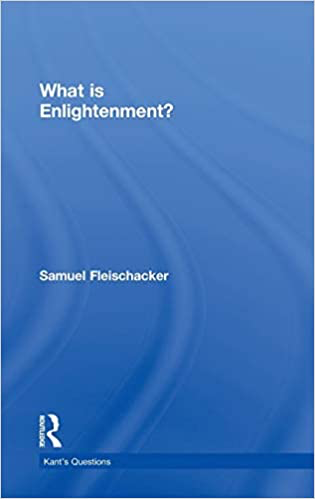
3:16: We’ve covered Smith and empathy so now let’s look at his two big works starting first with aspects of his Theory of Moral Sentiments not already discussed. Initially this was considered a masterpiece of ethics wasn’t it by his contemporaries and was at first influential. Can you say how it was received and why it made such an impact? Given all this, why did it eventually lose its place in the canon of great ethical philosophical texts for a long time?
SF: TMS was indeed very well received. It was translated into French and German soon after it came out, and became a staple part of the college curriculum in the American colonies. I think what Smith’s contemporaries liked best about it was its astute psychology and the fact that it used lively anecdotes to make its points. “A man is mortified when, after having endeavored to divert the company, he looks around and sees that nobody laughs at his jests but himself,” Smith writes. Or consider this wonderful tidbit, in defense of the claim that “small vexations excite no sympathy”: “The man who is made uneasy by every little disagreeable incident, … who takes it amiss that his intimate friend did not bit him good-morrow when they met in the forenoon, and that his brother hummed a tune all the time he himself was telling a story; who is put out of humour by the badness of the weather in the country, … and by the dullness of all public diversions when in town; such a person, I say, … will seldom meet with much sympathy.” This was a time when philosophy took many different literary forms — think of Mandeville’s poetic fable, Shaftesbury’s Soliloquy, Berkeley’s and Hume’s dialogues, Rousseau’s novels and autobiographical musings – and a certain literary elegance in one’s philosophy was highly prized.
TMS met that criterion nicely, in addition to its other merits, and I suspect that has a lot to do with the enthusiastic response it received.That’s not to downplay its philosophical innovations. I personally think that its account of sympathy improves on Hume’s (for Smith, I sympathize with you by projecting myself into your circumstances, not by feeling just what you feel: I think this projective account captures what’s ethically important about sympathy better than Hume does) – although many people at the time, including Hume himself, Kames, and Dugald Stewart were not persuaded of that – and Smith’s notion of an “impartial spectator,” as the proper perspective from which to issue moral judgments, may have had an important influence on Kant. But Smith seems to have been valued above all for what we might today call his “moral phenomenology” and his literary gifts were essential to his ability to carry that off.
One reason that TMS faded from the philosophical scene, I think, is that literary style became far less important to philosophy in the nineteenth and twentieth centuries, and rigorous system-building became far more important. TMS doesn’t do all that well on the score of rigor. It’s fuzzy in many places — Smith is even unclear about crucial features of both sympathy and the impartial spectator — and there is nothing like the exhaustive exploration of the foundations of morals in it that one finds in, for instance, Sidgwick. It’s only when foundationalism became suspect again, in the late twentieth century, and people were looking for something less dry and more plausible than utilitarianism and Kantianism, that TMS began to look appealing again: a refreshing, virtue-ethical alternative to what else was on offer.
3:16: Should he be regarded as a first critic of utilitarianism rather than as initially a proto-utilitarian? Has he arguments that contemporary utilitarians like the hugely influential Peter Singer should take note of and would find difficulty answering?
SF: Utilitarianism didn’t really exist yet in Smith’s time, but Smith is a sharp critic of the proto-utilitarian strains in his teacher Frances Hutcheson and friend David Hume. That’s in fact one of the main running themes of TMS.
Smith begins by saying that philosophers in recent times (he means Hume) had been paying too much attention to the effects of actions and not enough to the intentions that go into them and then develops a system primarily designed to evaluate intentions - as in tune or not in tune with the feelings that an impartial spectator would think should motivate us - rather than effects. Later, he explicitly criticizes Hume for using “utility” as a criterion for virtue: “[I]t seems impossible,” he says, “that the approbation of virtue should be a sentiment of the same kind with that by which we approve of a convenient and well-contrived building; or that we should have no other reason for praising a man than that for which we commend a chest of drawers.” Elsewhere – in WN and in his lectures on jurisprudence - he criticizes utilitarian accounts of punishment, and talks of respecting rights rather than maximizing happiness as the main aim of public policy. He does however regard increasing happiness as an additional aim of policy, in WN, which may be where his reputation as a proto-utilitarian comes from.Smith is also (here, like Hume) a virtue theorist rather than a theorist of particular ethical actions – he’s concerned far more with what our overall characters should be like rather than how we should act in each particular circumstance. He’s deeply opposed to the utilitarian tendency to add up pleasures across different people, rather than focusing on what we owe to each person in each situation. And he regards happiness as largely dependent on our being virtuous, so the idea of a neutral state of happiness at which virtue could aim does not even make sense to him.
Would Peter Singer be persuaded by any of these reasons for abjuring utilitarianism? I doubt it. Singer has been surrounded by Kantians and virtue ethicists all his life and has never budged a jot, as far as I know, from his radically utilitarian commitments. Should he be persuaded by Smith’s – and other people’s – anti-utilitarian arguments? Well, of course I think he should, but I start my moral thinking from anti-utilitarian premises – and I know of no knock-down argument that would show someone who begins elsewhere why they should adopt my starting point instead. This is just one of many respects in which I don’t think ethical orientations arise fundamentally from argument.
3:16: You say he was one of the first philosophers to be suspicious of philosophy itself – at least of philosophy as first philosophy - so was his project to understand common sense better than it was when handled by philosophers – in this was he in the camp of Reid? Was he arguing that actually common sense doesn’t actually claim many of the metaphysical and ethical positions they might seem to claim at first glance and that social embeddedness was important – and how did this make him of interest to the likes of Kant and Hegel who both were influenced by him weren’t they?
SF: My reading of Smith as suspicious of philosophy, and as a sort of common sense philosopher, is controversial among Smith scholars - few are likely to agree with me that Smith has much in common with Reid. Reid, after all, criticized Smith strongly and did not see himself as Smith’s philosophical heir. Nevertheless, I think a “common sense” reading of Smith makes good sense of the way he writes, and especially of the topics he does not address: he never takes up foundational questions in metaphysics or epistemology as Locke and Hume do (or even as Reid does: if only to reject the possibility of resolving them). Perhaps he was just not interested in those questions but perhaps he was deliberately avoiding them, and sticking to a philosophy drawn from and designed for what he and Hume called “common life.” I prefer the second reading – I think it makes better sense of what, on the whole, he was doing - but it would be hard to prove that it is right.
I don’t think Kant was especially interested in the social embeddedness of Smith’s work, but he did praise Smith highly for his astute insights into “moral awareness of humanity” (“die moralische Kenntnis des Menschen”): for his moral psychology, basically. How much Hegel knew of TMS is unclear; he does cite WN here and there, but makes no direct reference to TMS, as far as I know.
3:16: He wasn’t a consequentialist so what implications did that have for his views of politics?
SF: The common sense framework of Smith’s thought leads him I believe to be cautious about policy proposals that would radically or suddenly shake up the way people already live: he’s a reformer rather than a revolutionary, looking for political changes that people can integrate fairly easily into what they are already doing. He also tends to trust the workings of ordinary people’s judgments more than political theorists generally do, and to be suspicious of top-down programs that over-ride those judgments: his defense of free trade, and critique of limitations on the consumption and movements of the poor, derive from this commitment, I believe. And he’s an institutionalist: looking to build or improve general institutions – a clear and minimalist regulative framework for trade, a robust and trustworthy banking sector, good public schools – rather than to micro-manage policy. All of these things preserve ordinary people’s freedom rather than aiming at any particular outcome. In this sense, libertarians rightly look back to Smith as a fore-runner. But he cared far more about enhancing the agency of the poor, and far less about the “sacredness” of private property, than they do.
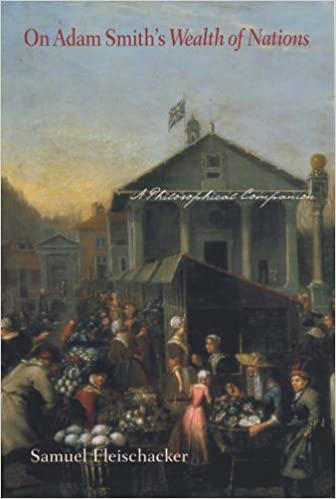
3:16: His Wealth of Nations is the text we’ve probably all heard of but few will have read! Interestingly, there’s no mention of morals in this book, so why not? Is this because he was trying to invent or develop an impartial theory of political economy – and has this distorted what he actually thought because really the values of such a theory were important to him? I guess I’m really asking whether he has a moral assessment of capitalism?
SF: It’s not quite true that there’s no mention of morals in WN. Smith says that independent workers are likely to maintain their morals better than ones who depend on a master; he has an extended discussion of whether an education in moral philosophy improves people’s morals (short answer: no); and he discusses the different sorts of morality that different churches inculcate. He also rails at several points against injustice and pride (things that are linked, for him), and praises “equity” and “humanity.” So there’s more of a moral tone to WN than people often suppose, and I don’t think he was aiming for an impartial theory of political economy: he clearly thinks some economic systems are morally better than others (because freer and/or because they do more for the agency and well-being of the poor). Indeed much of the book is a polemic against what he regards as bad economic systems. That said, much of the book is also studiously cool and descriptive, rather than polemical – he does want people to analyze economic structures, before judging them, in an impartial rather than an agenda-driven way.
Does he offer a moral assessment of capitalism? Well, bearing in mind that he doesn’t ever use the word “capitalism,” he does offer qualified praise for what he calls “the commercial system.” It vastly improves the standard of living of most people, he says, and is much freer than the feudal world that preceded it. But at the same time it narrows the occupations of many workers to tiny, mechanical tasks that require no mental skill and therefore lead their mental skills to atrophy, and it empowers unscrupulous merchants whose interests are opposed to the well-being of the vast majority of citizens. So I’d say Smith has a mixed assessment of what today we call “capitalism,” but on the whole he approves of it. That doesn’t necessarily mean he would approve of it in its current form: he lived just at the beginning of the Industrial Revolution, and never saw the rise of large corporations. Smith’s mixed, cautious assessment contrasts nicely, I think, with both the unqualified enthusiasm and the unqualified rejection with which capitalism tends to be met today.
3:16: What are the issues of epistemology that Smith discusses in the book, in particular, what does he think a philosophy of science and social science should be doing – and what evidence does he think relevant to these? Are there things in this still valuable to contemporary discussions regarding these domains, perhaps when trying to demarcate science from non-science, be it social or natural?
SF: Smith hardly ever discusses epistemology in either TMS or WN, nor does he say much about what he takes his own method in social science to be. In the collection of his “Essays on Philosophical Subjects” that was put together after his death by his friends Joseph Black and James Hutton, there is however a long, interesting piece on the history of astronomy, in which Smith — anticipating Thomas Kuhn, many say — takes science to be a matter of constructing theories to explain “anomalies,” which need to be revised when we encounter new anomalies. I think that that model can be applied to his own economic science in WN — such that he was constructing a theory, there, to explain the anomalies that earlier (mercantilist and physiocratic) economic theories failed to explain, and was aware that his own theory would someday be superseded — and I think we can also apply to him his characterization of philosophers and scientists as generalists who try to put together the many particular observations that others have come up with, rather than inventing anything wholly new. But aside from a certain cognitive modesty that it behooves all philosophers and scientists to maintain, there’s not too much here that might contribute to current debates over the nature of science.
Smith’s actual method in WN may however be useful for demarcating science from non-science. He takes care to assess and credential his sources when citing them — to let the reader know why he trusts a source and where he has doubts about it – rather than citing anyone blindly or following them absolutely. He is a careful and astute observer. He always explains clearly why he draws some broad conclusion from the observations or historical facts he mentions. And he makes economic claims on the basis of observations and historical facts, not of abstract mathematical models that grind out results from assumptions about how “rational egoists” are likely to act. Together, these features of his writing make for an excellent example of the Enlightenment critique of authority and emphasis on clarity, and of truly empirical, rather than mathematically-driven, social science.
One other thing about Smith’s method in social science: he consistently interprets events and conditions by way of a deep empathy for the agents involved in them. This enables him to present poor people in a much more respectable light than practically anyone had done before him – he sees them as tending to over -work themselves, while his predecessors and contemporaries regarded them as lazy; he sees their use of alcohol as just like that of well-off people, while his predecessors and contemporaries regarded them as drunkards; and he sees their tendency to join strict religious sects as reasonable, while his predecessors and contemporaries put that down to their ignorance and superstition – and to avoid demonizing even the merchants that he criticizes so strongly. The idea that empathy is a crucial tool of social science, both for explanatory and for normative purposes, is one I think we can still learn from Smith.
3:16: The book outlines his views about human nature in great depth – it includes vanity, self interest but also the possibility of impartiality and equality. Can you summarise this mix of selfish and selflessness that seems to characterize his view of human nature and what you see as a movement from homo moralis to homo economicus?
SF: It’s part of how Smith draws philosophy out of common sense that he sees people as having exactly the mix of selfish and altruistic tendencies, vanity and sensible prudence, and inclinations towards both favoring their loved ones and trying to be fair (impartial) to everyone, that we attribute to most people in daily life. The striking thing about his view of human nature is really how unstriking it is. He doesn’t see everyone as really an egoist at heart, like Hobbes or Mandeville, nor does he engage in utopian speculations by which we could all love one another if only our social structure were different. Instead, he takes us as we already think we are – when we are most realistic about each other, rather than overly cynical or overly optimistic - and works out from there: recognizing that most of us want to be good people, and that we quite often reach quite a high moral level, but not assuming that that can be done easily. And he does not, I believe, think we leave our drive to be moral at home when we enter the economic realm: we don’t become a wholly different creature who knows nothing of homo moralis.
Instead, the movement between homo economicus and homo moralis is a movement between two different ways of viewing people, in accordance with the different practices in which we engage. When we enter into the marketplace, we interact with others largely by appealing to their self-interest rather than their benevolence – “we address ourselves, not to their humanity but to their self-love, and never talk to them of our own necessities but of their advantages,” as Smith says, famously, about our relationship to our butchers and bakers in chapter 2 of WN – but we don’t become purely self-interested. That human beings are able to work together even when they are self-interested is Smith’s point in the butcher/baker passage – something he thinks is not true, on a regular basis at least, of any other animal - and the division of labor, and the markets in which we exchange the goods we produce as a result of the division of labor, are made possible by this fact about us. But all that is to say that we abstract from the benevolence of others, and their interest in being fair, when we engage in most market relationships. It doesn’t mean that those aspects disappear from our nature, or that we ignore them in the course of other relationships with our neighbors (as members of the same church, or people who have to help each other in the face of danger, or just people who meet casually in the street). It is the nature of economic practices that makes us appear to one another as homo economicus, not anything built into our characters.
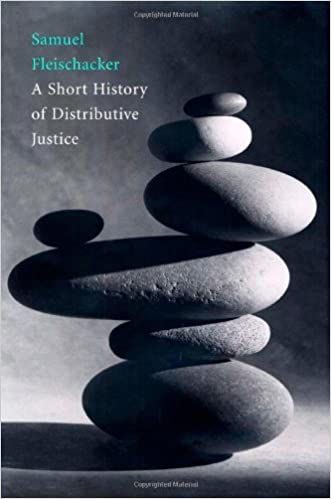
3:16: The Invisible Hand is the mechanism we’ve all heard about coming from Smith and this comes from his approach to the foundations of economics – so can you sketch for us what capitalism was for Smith and the place of this mechanism within that approach?
SF: I’m going to stick with Smith’s term “the commercial system” for what we call “capitalism,” since Smith was not trying to emphasize the role that capital – private ownership of the means of production – plays in this system (“capitalism” is a term that was made famous by Marx). On the contrary, he was somewhat skeptical about the role that people who live largely off capital – merchants – play in our socio-economic lives. What he emphasizes instead is commerce – the exchange of goods. Smith sees our modern-day economic system as taking the division of labor much further than it had gone in hunter-gather or pastoral or agricultural societies, and consequently depending much more than they did on markets: on exchanging the products of our specialized labor with one another, rather than making most of what we need for ourselves. And the big advantage Smith sees in this commercial system is that specialization makes for a vast expansion in what we can produce - an advanced division of labor produces many more goods than a world in which we try to make everything for ourselves. But where there are many more goods to go around, everyone’s standard of living rises, including that of the poor. This is itself the most important example of “the invisible hand.” Nobody intends to make the whole society better off when they develop more specialized forms of labor, or expand the markets by which goods can be exchanged — we are all just pursuing our own interest, or the interest of our families - but it happens anyway. Why so?
Some people think that Smith relies implicitly on a beneficent Deity (Providence) to bring individual interest and social good together in this way, but I think that he simply believes that opportunities for each of us to gain are generally made possible by a need, in the rest of our society, for what we have to offer. So the “invisible hand” reflects social forces acting upon us, leading us to do things that will wind up helping us whether we want to do that or not, rather than the hand of Providence. Smith is no Pollyanna about this invisible hand, I would add: he doesn’t think it always works. On the one occasion that he actually uses the phrase in WN, he says that merchants are led by their self-interest “in many cases,” not in all cases, to promote the good of society. Feudal lords also wind up helping society, in WN, only by destroying their own wealth and power, and religious leaders serve society well only if they are not wealthy or powerful. In addition, Smith decries the way that merchants try to deceive government leaders in the service of their self-interest. So self-interest and societal interest do not always align, for him. But on the whole they do, and that is enough, he thinks, to make the commercial system work well for us.
3:16: Everyone is talking about ‘harm’ these days it seems – and it was a key element in his approach to justice – one crucial thing about it is how difficult it is to define – so what was Smith’s theory of justice, how does harm fit into it and how was it to be understood?
SF: Smith says that justice is the virtue that forbids us to inflict “real and positive harm” on others, and that since a society in which people regularly do inflict harm on one another will fall apart, justice alone, of all the virtues, must be enforced. His point here is really to stress that other virtues should not be enforced: Smith thinks that in general we develop virtue best by informal interactions with one another, rather than having a state supervising us and trying to make us accord with a particular image it has of what people should be like. (This is central to his liberalism — his support for a state that fosters our liberty, as opposed to trying to instill virtue or promote Christianity.) The trouble is, he never really makes clear what counts as a “real and positive harm.” Is it just damage to body and property, and violations of other people’s liberty like kidnapping and fraud? Or does it extend more broadly than that? Smith indicates that it extends somewhat more broadly than that by including harms to reputation as injustices, but the question that we today probably most want answered is whether social structures that, say, keep people poor should count as an injustice or not. And this question is especially difficult if we suppose that Smith thinks we have an absolute right to whatever property we have managed to amass, and that for the state to take some of it, even by way of taxation, is itself a harm. Smith doesn’t think that, I believe – to suppose he does is again to commit the mistake of reading present-day libertarianism back into him – but he also doesn’t clearly say that even extreme poverty is a harm that justice should correct.
I think we can understand his account of justice to encompass this idea – to include, that is, some version of what today we call “social justice” – but I admit that I need to pull and stretch the framework he provides a bit to make this point, and even though he recommends government programs to mitigate poverty, he never places them under the heading of justice.
3:16: Locke. Hutcheson and Hume all had approaches to property rights and home ownership and this was a crucial feature of the new capitalist landscape. How did Smith’s approach differ from theirs and what were his views regarding inheritance and redistribution based on these?
SF: Smith agrees with Locke, Hutcheson and Hume that property rights are basic to social harmony – all agree, as had many in the natural law tradition before them, that communal arrangements in which nobody has private property lead to constant strife, disincentivize labor, and render generosity meaningless – but Smith differs from the other three in the way he grounds property rights.
Locke, famously, sees property as something we originally acquire by “mixing our labor” with things: a relationship between us and those things, therefore, that arises out of our self-expression and requires no consent from anyone else. Hutcheson sees property rights as something we grant one another out of benevolence: because I care for you, I want you to have a realm of things that you can call your own, earn by way of your own labor, and share with others if you want to be generous. Hume sees property rights as essentially conventional — a tool that societies establish to keep the peace among their members. Smith walks somewhere between Locke and Hume on this. He sees property rights as grounded, originally, in the fact that an impartial spectator would grant the first occupant a right to an apple or rabbit that she or he laid hold of – and since Smith’s impartial spectator is in large part a construct out of our society’s norms, this is a more social account of the foundation of property than Locke’s “labor-mixing” theory – but thinks that all property beyond that is a product of convention. Thus property in land, and property we acquire by way of inheritance, are things that societies eventually decided to institute because their history makes that convenient, and not because they are required by some “natural” right. It follows that there is much more room for changing property rights for Smith than for Locke.
If our history, or changed moral views, leads us to think that we should limit or abolish inheritance, for instance, or limit the private ownership of capital, there is no inherent injustice in our doing that, for Smith. Of course, a strong pragmatic argument would have to be given that such a change in property laws would actually be good for our society – make for greater happiness or freedom for most or all of us. And any such argument would face counter-arguments showing the disadvantages of such a change. But the issue is a purely pragmatic on Smith’s account, not a matter of natural rights or principles. And if we were to be convinced that the change was useful, there would be nothing wrong with going for it.
3:16: What were his views about distribution and poverty alleviation? Right wing economists like to say there’s no role for anything but the hidden hand mechanism – and Reagan and Thatcher took the Chicago economists at their word often in the name of Smith didn't they - but as we’ve seen this isn’t Smith at all is it?
SF: Exactly. The transformation of Smith into a libertarian ideologue is a real travesty. One can certainly use Smith to oppose protectionism — whether in the form of tariffs or in the form of government support for particular industries – but not to oppose government support for the poor. To be sure, he does consider it a disaster for governments to micro-manage markets, and believes that broadly free markets will do more than anything else to raise the standard of living of the poor. But he consistently says that the main thing to watch out for are laws that favor “masters” over their workers, not the other way around, he never opposed the English Poor Law, and he advocated for some policies – a system of public education, especially – that would have vastly expanded what the government did on behalf of the poor. What the Chicago economists wholly overlooked was that in Smith’s day government policy as regards poor people mostly tried to control them – to cure or minimize their “vices” (laziness, excessive drinking) – rather than to help them, and that Smith, more than anyone else in his time, wrote of the poor with a respect that made them out to be at least as virtuous as his well-off readers (more so, in some respects). It’s for that reason, more than anything else, that I have argued that Smith is actually an ancestor of policies that work to alleviate or eliminate poverty, not of the controlling or punitive forms of political economy that try to break up workers’ organizations, or presume that aid from the government will lead poor people to stop working. As you may have noticed, I am stressing Smith’s general outlook here, more than any specific policies that he proposed.
It’s a mistake, I think, to look for much of a roster of poverty policies in WN, given that it was written in a time when no politician is likely to have taken such policies seriously (there was no Overton window for them, we might say). But the general view of poverty for which Smith advocated was utterly different from that of Reagan, Thatcher, and their advisors, and is taken up today by people with a very different roster of specific policies.
3:16: Sumarising Smith, do you agree that law, peace and a good taxation system were for him the bedrock of a good social arrangement?
SF: You’re alluding, I presume, to the famous line from one of Smith’s early lectures, in which he said that “Little else is requisite to carry a state to the highest degree of opulence from the lowest barbarism, but peace, easy taxes, and a tolerable administration of justice; all the rest being brought about by the natural course of things.” It’s a nice line, but Smith uttered it (if he did: we get it only from a report by Dugald Stewart) in 1755, years before he began to work on WN and decades before he published it. So I’d be wary of using it to sum up his considered views. WN adds in — at least — the need for a good banking system and education for everyone. It also urges governments to tamp down the power of churches, worries more than the early Smith did about protecting poor workers from the machinations of their masters, and is more concerned that taxes be fair and effective than that they be “easy.” But certainly Smith remained throughout his life a strong advocate of law and peace – he abhorred the readiness to go to war that mercantilism fostered – and he thought that governments should build a sensible and fair general framework for the economy rather than trying to micro-manage it with taxes and tariffs. I guess I would tweak your summary of Smith as follows: “law, peace, and general institutions that help everyone (but especially the poor) are the bedrock of a good society.”

3:16: As we began with saying, Smith is a giant of Enlightenment thinking. National Socialism is sometimes written about in relation to the ideas and philosophy of the Enlightenment, and Heidegger as the leading Nazi philosopher showed that having that philosophical tradition was no guarantee that you’d be immune to Absolutist politics – some have even argued that it’s where the views of Smith et al lead. A great surprise is that several of Heidegger’s greatest followers were Jews, again ruffling any line that tries to show how ideas lead to predictable consequences. You’ve edited a book looking at Arendt, Strauss, Jonas and Levinas as followers of Heidegger. How do you understand this phenomenon and are there lessons for todays’ thinking about extremism and fascism?
SF: Well, to start with, Heidegger was a sharp critic of the Enlightenment, not someone who stands primarily in its tradition. That said, there is good reason to criticize the rationalism and scientism and individualism of the Enlightenment, and I think Arendt, Strauss, Jonas and Levinas at first found Heidegger’s critique of Enlightenment modes of thinking very persuasive and valuable. Many people did, in the 1920s. The idea that reason alone, and the intensely rationalistic science that we moderns suppose can tell us the truth about everything, empties our lives of all significance and leads us to see even our fellow human beings, and certainly the rest of nature, just as things we can manipulate, resonated deeply with people in the early decades of the twentieth century: especially after the devastating and pointless first world war made the notion that our scientific mindset was bringing on greater and greater “progress” ring hollow.
I think it’s a mistake to blame the Enlightenment — Smith et al — for the malaise and horrors that brought on this early twentieth century despair, or for many of the other evils often blamed on it (Smith and Kant were for instance critics of colonialism rather than advocates of it), but some of the charges against it make sense and it’s understandable why a radical critique of the Enlightenment, like Heidegger’s, initially seemed to offer an exciting and promising way forward. And the fact that Heidegger’s critique of rationalism deeply undercut liberal politics was I think not at first visible to people like Arendt and Jonas; they certainly did not anticipate that it might license a violent and viciously racist totalitarianism. They were wrong to miss that, and they spent much of their lives, afterwards, trying – not entirely successfully - to correct for the anti-liberal strain in Heidegger while holding on to what was insightful in his work.
I still think we have a lot to learn from Heidegger, but we also have much to earn from the dangers that come with any attempt to reject the Enlightenment. A deeply anti-rationalist manner of thinking – and a concomitant attack on the Enlightenment – has again taken hold of many people today, often justified by intellectuals with arguments that look uncannily like Heidegger’s. This is obviously true of large swathes of the political right, but it’s also true — very disturbingly — of supposedly “progressive” movements. Many movements that are pursuing eminently laudable ends are increasingly making illiberal calls to eschew compromise, shut down dissident voices, and construe “diversity” entirely in terms of ascriptive characteristics. These are grave warning signs, pointing to a future in which progressive movements may well either themselves turn into, or call up in reaction, precisely the sorts of violent totalitarianism that so disastrously dominated much of the world in the twentieth century.
Claims that science and even rationality are simply Western projects, and sources of colonialism and oppression, are particularly dangerous. The lesson to learn from the attraction of liberal-minded Jews to Heidegger is that we should all beware of critiques of rationality and science, no matter how incisive they may be in some respects. Only by respecting one another as rational beings, and reasoning together with others rather than trying to impose our vision of how to live upon them, can we keep our politics free of violence, oppression, and cruelty. In this respect, Smith, Kant, Hume, and the rest were entirely right, and we reject them at our peril.
3:16: And again, have you a further five books to recommend to us?
SF: 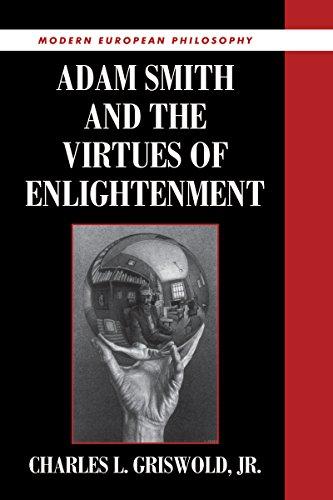
Charles Griswold, Adam Smith and the Virtues of Enlightenment – I figure I should start out this time with some philosophical books on Adam Smith. There have been many such books lately, including some very good ones, but I still regard Griswold’s now twenty-year-old book to be the best. I disagree with Griswold on many issues, but he demonstrates beautifully how to wrestle philosophically with Smith, and uses Smith to explore deep questions about the virtues and vices of the Enlightenment more generally. I particularly recommend his discussion of sympathy, and of the difficulty of maintaining confidence in our moral beliefs once we adopt naturalistic accounts of how they arise.
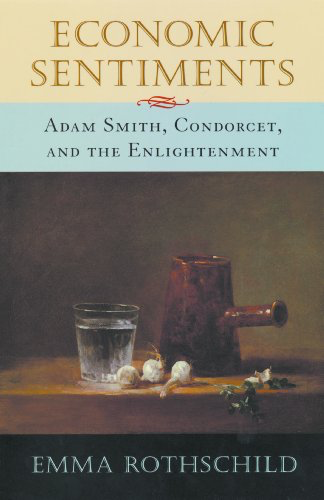
Emma Rothschild, Economic Sentiments – Rothschild is an intellectual historian more than a philosopher, but she probes some of the deepest questions about Smith’s philosophical commitments here. She has also done more than anyone to rescue Smith from the right-wing interpretive prism through which he was seen for so long. Her 1992 essay “Adam Smith and Conservative Economics” – a version of which appears as chapter 2 of this book – was in fact one of the main things that set me on the way to my own progressivist reading of Smith.

Miranda Fricker, Epistemic Injustice – Like Korsgaard’s books, which I mentioned last time, this is philosophical work written with such panache that I read it through almost like a novel. It also practically invented an entire new field, at the intersection of epistemology and political philosophy, that has since become extremely important. I’ve taught it a couple of times, in introductory and intermediate-level epistemology classes, and it makes for wonderful discussions.
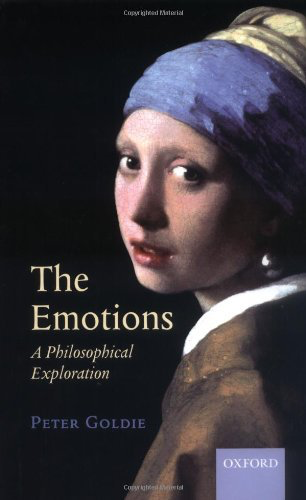
Peter Goldie, The Emotions – Goldie was a delicious writer, working in the great humanist tradition of philosophy represented by his PhD advisor Bernard Williams, with a gift for astute introspection, telling examples, and nuanced distinctions. I particularly recommend the seventh chapter in this book, “How we think of others’ emotions,” which I found immensely helpful to my own work on empathy.

Samuel Scheffler, Death and the Afterlife – This is a book I admire while strongly disagreeing with it. Scheffler presents our contribution to ongoing projects that will continue to benefit humanity after we die as the true “afterlife” that gives our lives meaning. I still hope for a much more super-natural kind of afterlife and would actually someday like to use Scheffler’s arguments as a foil for why I think we need to hope for such a thing. But the great thing about this book is that one <em>can</em>vigorously argue with it: it’s wonderfully clear and likely to spark very lively discussions. Like the best works of philosophy, over the centuries, it also takes up some of the most profound questions human beings have to deal with.

ABOUT THE INTERVIEWER
Richard Marshall is biding his time.
Buy his second book here or his first book here to keep him biding!
End Time series: the themes
Huw Price's Flickering Shadows series.
Steven DeLay's Finding meaning series
NEW: Joseph Mitterer's The Beyond of Philosophy serialised